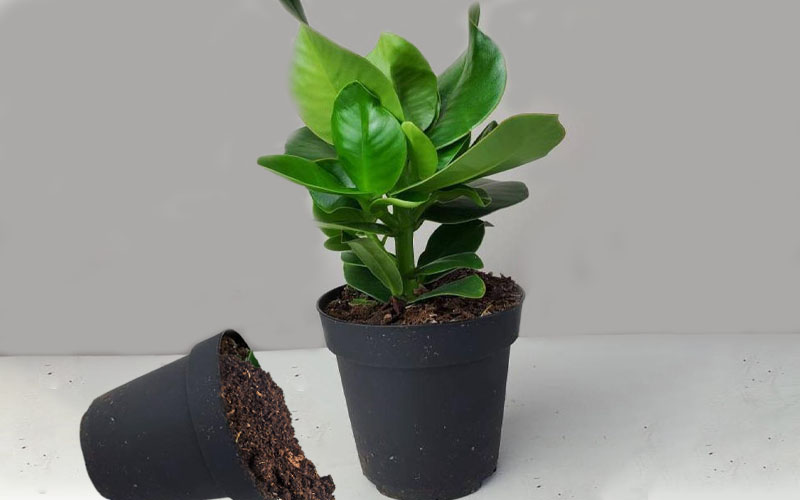Clusia Rosea is known with many names among plant enthusiasts, but most people recognize it as “Autograph Tree.”
The mystery behind this name is its superfluous, fluffy, and thick leaves on which people scratch their names and see them growing with these words.
There are many interesting facts about this tree, and it is effortless to care about. If you are looking forward to adding a new plant to your home, Clusia rosea is an excellent choice.
Before heading to buy Clusia Rosea, read this fascinating and to-the-point guide to make a wise choice.
Table of Contents
Clusia Rosea

Clusia is the genus, while Clusia Rosea is the tropical and subtropical plant species in the genus known with names like an autograph tree, copey, cupey, balsam apple, pitch-apple, and Scotch attorney.
Some people call it Clusia major; however, it is not.
| Scientific Name | Clusia rosea |
| Genus | Clusia |
| Plant Type | Perennial evergreen |
| Blooming Season | Summers |
| Hardiness Zones | 10 to 11 |
| Famous Names | Autograph tree, Copey, Balsam Apple, Pitch Apple |
Why Should You Keep Clusia Rosea At Home?
Well, the exotic texture of this plant, along with drought tolerance ability, makes Clusia Rosea an excellent choice to keep in homes as well as to grow on landscapes just like Jericho’s Rose.
Yes! This plant can be grown perfectly indoors and outdoors. Wow!
Beautiful Teardrop Leaves Haver Clusia rosea Is Perfect Ornamental Choice:

Though the Clusia genus has almost 150 different species but most common among all is Clusia Rosea.
Thanks to its stiff, dark green & olive-colored leathery leaves that can be carved and still keep growing, up to 9 inches. Do you know the little prostrata that also have fluffy leaves?
You can customize this tree by carving alphabets or names on the leaves, and they will grow with the same engraved patterns.
Besides this, it also produces white summer flowers followed by green fruits that become black and split open when ripe. All with this, birds love eating their seeds.
If you love to invite birdies at home, Clusia Rosea fruit will do that for you.
Clusia Rosea Care:
Balsam Apple, Pitch Apple, or Clusia Rosea tree is famous for growing inside homes.
If you live in tropical areas and have feasible conditions, the autograph tree can survive outdoor for you as well.
“The Best Time to plant the autograph tree is Spring or Fall.”
When you need to grow this plant, you will need:
1. Placement:
Placement: The room that receives sunlight
A window that receives sunlight directly for most of the day can be excellent to keep this plant.
FYI, it can tolerate partial shade, too, but you will have to provide it with some sunlight habitually, just like beautiful Rosso plant.
For this, shift your plant during the day according to the requirements and availability of the sun.
2. Soil Requirement:

Soil: Purely organic, soft, sandy, well-draining potting mix
Clusia Rosea tree is an epiphyte like Peperomia Prostrata. These plants grow on the organics of other dead plants.
It means the soil should be highly organic, made by using potting mix and medium of orchids. Plus, the texture should be soft, sandy, and well-draining.
3. Humidity + Temperature:
High Temperature: Between 60 and 85 degrees Fahrenheit
Epiphyte plants love humidity and cannot tolerate medium to low temperatures.
You need to maintain a high temperature inside when keeping these plants indoors. Otherwise, the plant will not grow according to expectations.
When you keep the aforementioned 3 tips under consideration, your plant will thrive and show delightful and satisfying growth.
Clusia Rosea Everyday Care:
Once you see that your plant is growing, it doesn’t mean that your work here has finished. In fact, it is time now to keep your plant doing well indoors, taking proper measures of care.
What are those or how to take care of clause Rosea, the autograph tree, find in the lines coming ahead:
- Keep up with the required amount of sunlight.
- Do not forget to move your plant to the sun-facing window.
- Always maintain humidity and temperature
Along with this, when you are taking care of your plant, follow these steps:
4. Watering:
This plant loves humidity and loves drinking water.
However, overwatering is not feasible at all. Many people make a mistake by overwatering their plants and making their roots soggy and rotted with mold.
The plant requires regular watering; however, a slight misting on the soil is recommended instead of drenching and soaking it thoroughly with water.
Some precautions to take when watering are:
- Never use cold water for watering as it can cause leaf fall to your plants
- Always water plant during early hours of the day, instead of noon or evening
- Early time watering will help water to evaporate well and throughout the day
Lastly, after one year, when it is mature, you can leave it with small sessions of drought. The plant enjoys doing so. You can avoid it as well if you want your plant to sprout faster.
5. Fertilizing Requirement:

Fertilization: Three times in a year during growing seasons
Though this plant loves humidity and sprouts well during summers and spring, it requires fertilization at least once during the fall season.
Evenly diluted with liquid fertilizers, organic fertilizers should be used in spring, summer, and fall, once in each season.
6. Repotting Your Plant:

Autograph plant or clusia Rosea spreads more widely when matures than growing in the upward direction. Therefore, roots spread even wider.
In this case, the plant can require repotting from time to time. You can shift this plant when it matures to the outside soil having a pH level of 10 to 11.
| Mature Size | 8 to 10 feet tall and wide (can reach 25 feet tall as a tree) |
| Flower Color | White or pink |
| Leaf Type | Thick, dark green, or olive-colored |
| Fruit | Black when matures |
On the other hand, for indoor repotting, choose a larger pot than before and make sure to transfer the plant during the growing season to get used to the new soil easily.
Maintain Humidity:
You need to maintain the humidity around your plant in the long run so that it can sprout well and disease-free.
Therefore, if you see that the humidity or temperature around your plant is decreasing, you can maintain humidity by using the following three different ways:
- Mist it with the spray bottle when the sun is shining to create a humidity effect
- Use water trays with pebbles and put your plant pot in it to create humidity around it
- Use natural humidifiers for humidity
Propagating Autograph Tree:
Clusia Rosea or autograph tree can be propagated through seeds as well as stems.
To propagate it through stems, you can simply cut the branches and sow in the pots. The plant will reproduce so quickly, and you can replant the branch cuttings as many times as you need to make the collection of autograph tree plants.
Clusia Rosea is Toxic:
When just growing, plant fruits are in green color and toxic for birds, animals, and kids. Therefore, you will have to keep your kids and pets away from this plant.
In case of intake, the fruit can cause severe stomach irritation, diarrhea, vomiting, etc.
When watering your plant, do not let the fruit or leaves sap touch your skin as it is also reported to work as skin-irritant.
Remember: Clusia Rosea fruits aren’t edible
Bottom Line:
Do you love succulents and plants that can be grown effortlessly at home? Check our gardening collection as we have plenty of suggestions for you.
Before leaving, bless us with some words for feedback.
Have a nice day!

